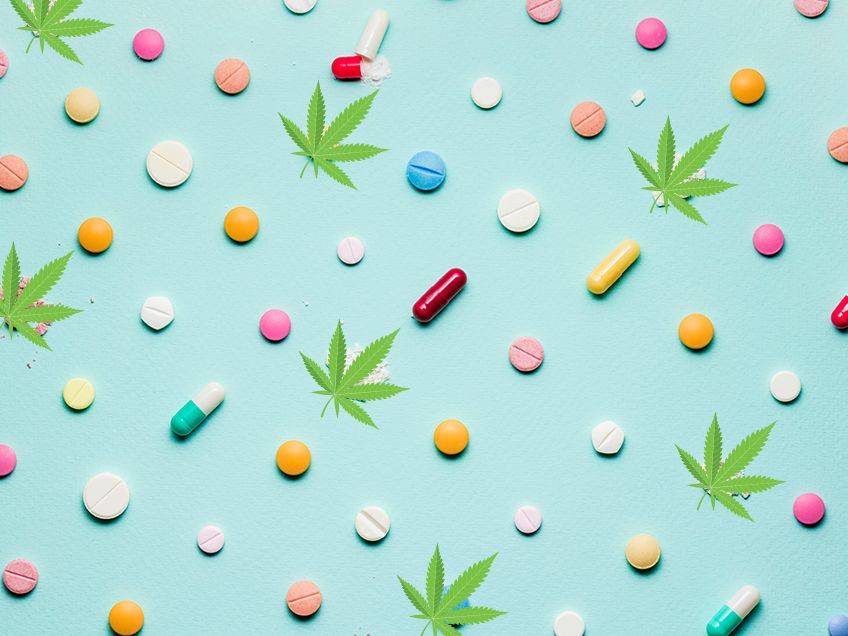- You have no items in your shopping cart
- Continue Shopping

Cannabis, like many other substances, can interact with various prescription medications, affecting their efficacy and side effects. Understanding these interactions is crucial for safe and effective use of both cannabis and pharmaceuticals. Here, we explore how cannabis may affect prescription drugs, focusing on different types of interactions and their potential impacts.
Types of Drug Interactions
When two substances interact, their effects can be classified into two main categories:
- Synergistic Effects: In this case, the combined effect of the substances is greater than the sum of their individual effects. For example, if substance A has an effect of 1 and substance B has an effect of 1, their combined effect might be 3.
- Additive Effects: This occurs when the combined effect of two substances is equal to the sum of their individual effects. For instance, if substance A and substance B each have an effect of 1, their combined effect would be 2.
Cannabis contains various compounds that can interact with prescription drugs, potentially leading to either additive or synergistic effects. Most interactions are mild, but it is crucial to consult with a healthcare professional to understand how cannabis might impact your medication.
Cannabis and Blood Thinners
Cannabis compounds like THC and CBD can interact with blood-thinning medications, such as Disprin and ibuprofen. Cannabis may slow the metabolism of these drugs, potentially increasing their effects. THC has the added potential to displace warfarin from its protein-binding sites, which could further alter its effectiveness. Always consult your doctor before combining cannabis with blood-thinning medications.
Cannabis and Blood Sugar/Insulin Levels
Cannabis is often associated with the “munchies,” leading some to believe it may contribute to weight gain. However, recent studies suggest a complex relationship between cannabis and weight. Evidence indicates that cannabis might reduce insulin resistance, enhance metabolic processes, and improve blood sugar control.
Despite these findings, most studies are epidemiological, analysing general health patterns rather than specific drug interactions. There is no conclusive evidence on how cannabis interacts with insulin or other blood sugar-related medications. Thus, caution is advised when using cannabis alongside insulin drugs, and professional medical advice should be sought.
Therefore, although there is studies to suggest that cannabis can assist in lowering blood pressure, there is no evidence to suggest that consuming cannabis alongside insulin drugs, will not result in an increased glucose levels. Precaution should be taken when utilizing insulin drugs with cannabis and a medical professional should always be consulted for safe consumption when using insulin.
Cannabis and Blood Pressure Medications
Cannabis activates CB1 and CB2 receptors, leading to increased oxygen consumption and reduced blood flow in coronary arteries. This cardiovascular response can interact with blood pressure medications, potentially causing a synergistic effect. It is essential to consult a healthcare provider to manage these interactions safely.
Cannabis and Sedatives
Sedatives such as alcohol, benzodiazepines (e.g., Ativan, Valium), certain antidepressants, barbiturates (e.g., phenobarbital), and narcotics (e.g., codeine) affect GABA neurotransmitters, producing a calming effect. Similarly, cannabinoids and terpenes like myrcene can have sedative effects. However, the impact of cannabis on sedatives is typically additive rather than synergistic. Although cannabis does not potentiate the sedative effects of these drugs, combining them should be done with caution to avoid any adverse effects.
Cannabis and Antidepressants
Cannabis use alongside antidepressants can have varied effects. Low doses of THC might induce euphoria and relaxation, while high doses could increase anxiety or even cause panic attacks. CBD, another prominent cannabinoid, may counteract some negative effects of THC and show promise in treating anxiety and depression. If you are considering cannabis for managing mental health issues, opt for strains high in CBD and consult your healthcare provider for personalised advice.

Cannabis can interact with various prescription medications, and the effects of these interactions can range from mild to significant. Understanding these interactions and consulting with a healthcare professional is essential to ensure safe and effective use of both cannabis and prescription drugs.
Disclaimer: This content is for educational purposes only. The information provided is derived from research gathered from external sources.
External Resources:
- https://www.webmd.com/vitamins/ai/ingredientmono-947/cannabis
- https://www.ncbi.nlm.nih.gov/books/NBK425767/
- https://www.ncbi.nlm.nih.gov/pmc/articles/PMC8307883/
- https://marijuanadoctor.com/blog/marijuana-and-antidepressants-are-they-safe-consume-together
